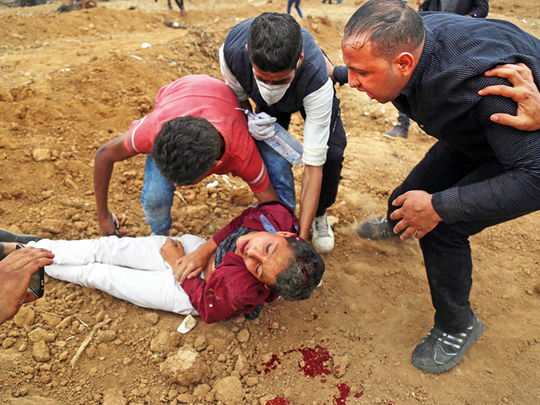
Jabaliya, Gaza: He lay down among the tombstones in a cemetery beside his grandfather’s house, his cousin said, in what passes for child’s play in the grim reality of Gaza. Telling his cousin he hoped to be buried there, he scooped up piles of sand as if digging his own grave.
The boy, Mohammad Ayoub, then sneaked off Friday, disobeying his mother, to join the weekly protest along the fence dividing Gaza from Israel. Shot through the head by an Israeli regime sniper, according to the Gaza Health Ministry, he was buried in the same small graveyard that night.
Ayoub’s relatives and Gaza health authorities initially said he was 15; his identity card showed that he turned 14 two months ago. His mother said he had wanted to be a “shahid,” Arabic for martyr, since kindergarten, even before he understood what that meant.
Ayoub’s world was circumscribed on one side by the Mediterranean Sea, where he liked to swim at dawn, and by the borders with Israel and Egypt, largely sealed for most of the 2 million residents of the Palestinian coastal territory.
But his death has intensified international attention and censure over the Israeli regime’s handling of the protests that began March 30, both because of his age and because it was caught on graphic video.
It has also been widely covered in Israel and has created some unease among the public, which has widely supported the regime’s actions on the border.
Isolated and impoverished, plagued by chronic electricity shortages and hardships exacerbated by Palestinian infighting, Gaza has bred a young generation that lives without hope.
Ayoub’s father, Ebrahim Ayoub, 50, said Saturday that his son was innocent. He spoke from the mourning tent outside the family’s single-story home with a corrugated metal roof in the hardscrabble Jabaliya refugee camp in northern Gaza. “Even if he touched the fence, he was peaceful,” he said, adding that his son had not been throwing stones or holding a weapon.
Basel Ayoub, 18, the cousin who was with the victim at the cemetery and recounted the scene there, saw him again at the protest site around the time he was killed. Basel and another cousin who was there, Mohammad Hamouda Ayoub, 29, said the victim had been sitting on the ground with other boys, then got up and ran to escape clouds of tear gas, when he was shot.
Over the past four Fridays, 40 Palestinians have been killed by the Israeli regime along the Gaza frontier while protesting, the 11-year blockade of the territory. The protesters are also pressing for Palestinians’ return to lands in what is now Israel.
The Gaza Health Ministry has recorded three other minors among the dead. One was 17, another 15 and a third a few days short of his 14th birthday. Hundreds of other people have been injured.
Dubbed the “Great Return March,” the protests are expected to peak May 15 when Palestinians mark the Nakba, or the catastrophe, of Israel’s foundation and the 1948 war over its creation, during which hundreds of thousands of Palestinians fled or were expelled from their homes.
One of six siblings ranging in age from 3 to 17, Ayoub grew up in the alleyways of the Jabaliya refugee camp with refugees and their descendants from Al Faluja, a former Palestinian village less than 20 miles northeast of Gaza.
He had already lived through three wars.
His father worked for the Palestinian National Authority security forces before Hamas routed them during factional fighting more than a decade ago. Hamas officials came to pay condolences after Ayoub’s death, but left after a few minutes amid an altercation with supporters of Fatah, the rival Palestinian group, whose flags adorned the family’s mourning tent.
His mother, Raida Ayoub, 39, said her husband had taken him and his two brothers to the protest on the first two Fridays. They skipped the third. This Friday, too, she told him not to go, fearing for his safety, and took him to his grandfather’s house instead.
But after playing outside there, he met an aunt and told her to tell his mother he was going to the protest “just for one hour”.
In the video of his killing, panicked voices can be heard shouting that he has been shot in the head. Others immediately proclaim him a “shahid”. A few hours later, he was in the ground.











